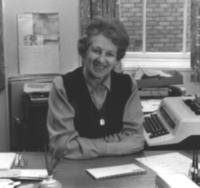Julia Cameron
John Stott, one of the most productive leaders of recent times, had an unusual capacity for hard work, a gift for focused concentration, and a constant sense of being 'dissatisfied'.1
The fruit of his work, and of his ideas, was multiplied, in human terms, through four means: (i) his fellow workers, (ii) his industry, (iii) his instinctive sense of strategy, and (iv) his unique symbiotic relationships, especially with IFES2 and the Lausanne Movement. There was, for him, a porous line between friend and fellow worker. We look here at his fellow workers, glancing at the networks which extended his ministry.3
Stott's global ministry first rested on a team of two, himself and his secretary, expanding eventually in 1980 into a team of three. They called themselves 'the happy triumvirate' after Charles Simeon's use of the term for himself and his curates.4 But let us not rush ahead.
EARLY NETWORKING AND FRIENDSHIPS
From 1950, aged 29, John Stott was Rector of All Souls' Church, Langham Place. He kept in close touch with the work of Scripture Union camps led by E. J. H. 'Bash' Nash, through whom he had become a Christian while at school, and who became to him a 'philosopher and friend.'5 For years, Stott got to know each rising generation of camp officers, extending his friendship circles. From these camps would come evangelical leaders in the church, the armed forces, academia and the business world. Out of those friendships, and friendships to come, not least through IFES and Lausanne, would emerge board members, or financial supporters of his ministries, or advocates in other ways. Friendship was Stott's modus operandi.6
THE GROWTH OF A WORLDWIDE MINISTRY
 In 1956 John Stott invited Frances Whitehead, a young Christian in his congregation, then working for the BBC, to become his secretary. Others in the role had not lasted long. He needed someone reliable, in whose hands he could leave the administration of the church when he travelled.7 The US and Canadian Intervarsity movements were pressing him to lead university missions. Now, for the first time, and with the blessing of the Church Council, he could plan a trip to North America. Frances Whitehead would remain in this role for 55 years.8 In time they would be known around the world as 'Uncle John' and 'Auntie Frances'. Stott named Frances in his will as his 'friend and Executor'.
In 1956 John Stott invited Frances Whitehead, a young Christian in his congregation, then working for the BBC, to become his secretary. Others in the role had not lasted long. He needed someone reliable, in whose hands he could leave the administration of the church when he travelled.7 The US and Canadian Intervarsity movements were pressing him to lead university missions. Now, for the first time, and with the blessing of the Church Council, he could plan a trip to North America. Frances Whitehead would remain in this role for 55 years.8 In time they would be known around the world as 'Uncle John' and 'Auntie Frances'. Stott named Frances in his will as his 'friend and Executor'.
Word of the 1956-57 North American missions got around through the IFES network, and led to invitations from universities in Africa, Asia and Australia. Friendships made with students and IFES national movement staff would lead to further collaboration.9 There was rich symbiosis10 between John Stott and IFES; and he would incorporate ministry to students, or meetings with IFES national staff, into each overseas trip.
In 1961, with much prescience, Stott founded EFAC.11 In 1966 he played a seminal role at a congress on evangelisation, convened by Billy Graham in Berlin. By the late 1960s, both Stott and Frances Whitehead were under immense pressure, with growing international commitments alongside the needs of All Souls'. In 1970 Stott delegated the pastoral leadership of the church to Michael Baughen, to focus on global ministry. He then moved into a tiny flat, built above the garage at the back of the rectory, and Frances into a small room on the ground floor. This team of two formed the modest nerve centre for what became Langham Partnership. (When the Study Assistants arrived from 1980, they would have a desk in Stott's small bedroom, which had been rescued from a skip!)
With new initiatives, it was Frances who built the infrastructure. Again and again, friends were then called upon to chair committees, serve on boards, bring financial nous to the table.
From 1974, Stott was immersed in the nascent Lausanne Movement.12 For over thirty years, Lausanne, IFES and the later Langham Partnership, could not be pulled apart, and friendship circles kept extending.
In 1982 the London Institute for Contemporary Christianity (LICC) opened its doors, and provided the place for many of Stott's younger friends from IFES and Lausanne to meet and exchange ideas.13 Stott's books, published mainly by IVP and sister IFES-linked publishing houses, were by then reaching into many languages.
As Jim Packer said on Stott's death, 'He had no peer, and we should not look for a successor'. Such a story of strategic, yet genuine, friendship for the cause of the gospel is unlikely to be repeated.
NOTES
